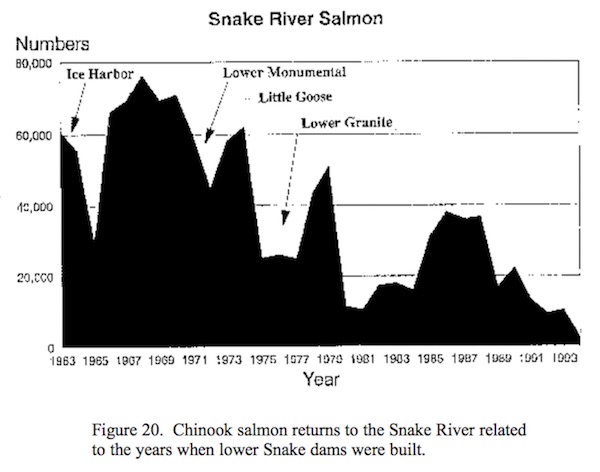forum
library
tutorial
contact

It Doesn't Take a Degree in Marine Biology
to See Dams are Bad for Fish
by Steve Hawley
Columbia Basin Bulletin, November 20, 2020
|
the film forum library tutorial contact |

|
It Doesn't Take a Degree in Marine Biology
by Steve Hawley
|
"In truth, he couldn't have been that shocked.
He was saying a similar thing in 2008."
 Last July, National Geographic reported that global populations of migratory fish have declined by 76 percent over the past half-century. Habitat loss was cited as one of the main culprits, and dams as a major cause of habitat loss. This type of cause and effect in worldwide decline holds true in the Pacific Northwest. It doesn't take a degree in marine biology to see that dams are bad for fish. But it might take someone with a PhD to convince you that salmon don't need rivers.
Last July, National Geographic reported that global populations of migratory fish have declined by 76 percent over the past half-century. Habitat loss was cited as one of the main culprits, and dams as a major cause of habitat loss. This type of cause and effect in worldwide decline holds true in the Pacific Northwest. It doesn't take a degree in marine biology to see that dams are bad for fish. But it might take someone with a PhD to convince you that salmon don't need rivers.
According to research published last month by Canadian fisheries scientist Dr. David Welch, salmon populations in the northern Pacific have been declining over the past few decades at a uniformly alarming rate -- 50 to 65% from California to Alaska. Ergo, the condition of the river, dammed or undammed, must not matter much. "We were shocked to discover that the survival of salmon across British Columbia or in Puget Sound is now as low or lower than the reported survival of Snake River populations," Welch said to the journal Scientia.
In truth, he couldn't have been that shocked. He was saying a similar thing in 2008, when he published a paper that contended juvenile salmon migrating out of the less dammed Fraser River in British Columbia survive at about the same anemic rate as juveniles in the thoroughly dammed Columbia. As reliably as rain in the Pacific Northwest, research that diverts blame for salmon's demise from dams to just about anything else gets funded and promoted by hydropower interests. Sometimes this science isn't worth its salt.
In the early 2000's, Welch's private firm, Kintama Research Inc., garnered contracts with the Bonneville Power Administration worth $7 million. A Fish Passage Center review of Welch's methodology in his 2008 paper identified a lot of issues.
His most recent findings were immediately amplified by the utility lobby, Northwest River Partners. In a letter to the Governors of Oregon, Washington, Idaho and Montana, who recently committed to discussing the salmon problem, Riverpartners cited Dr. Welch's work, and recommended "trans-oceanic" obstacles to salmon recovery be taken into primary consideration.
For policymakers, emphasizing the emerging crisis in the ocean while ignoring the long emergency of our over-dammed rivers will be an exercise in futility. For starters, the northeastern Pacific is a vast, poorly understood ecosystem that also happens to be well outside the jurisdiction of any authority in the Pacific Northwest.
Even if Dr. Welch's most recent assessment proves prescient -- and better research shows that it may not -- a fix for a warming ocean is decades away. In the meantime, saving salmon will require a rather urgent emphasis on repairing what is immediately repairable -- rivers we thoroughly understand and over which we have some control.
With that in mind, dam removal works. Not only do hundreds newly free-flowing rivers around the country attest to this fact, the best available science on Columbia Basin salmon draw the same conclusion. Since 2000, the BPA has spent over $100 million on two separate, court-ordered federal studies that each conclude removing four dams on the lower Snake River would be the most effective way to restore salmon.
The four governors should start with this $100 million conclusion. They should work on a blueprint to make it a reality, wherein every party with a stake in the health of the river comes out economically as good or better than where they stand today.
Some of our best laws mandate salmon recovery. The best politics will get us there. By contrast, the worst, most cynical politics will lean on science as a flimsy rationale for doing nothing. The Governors should aim high -- at least higher than the region's myopically self-interested federal power agency, the BPA, which has thus far failed miserably at salmon recovery.
learn more on topics covered in the film
see the video
read the script
learn the songs
discussion forum
